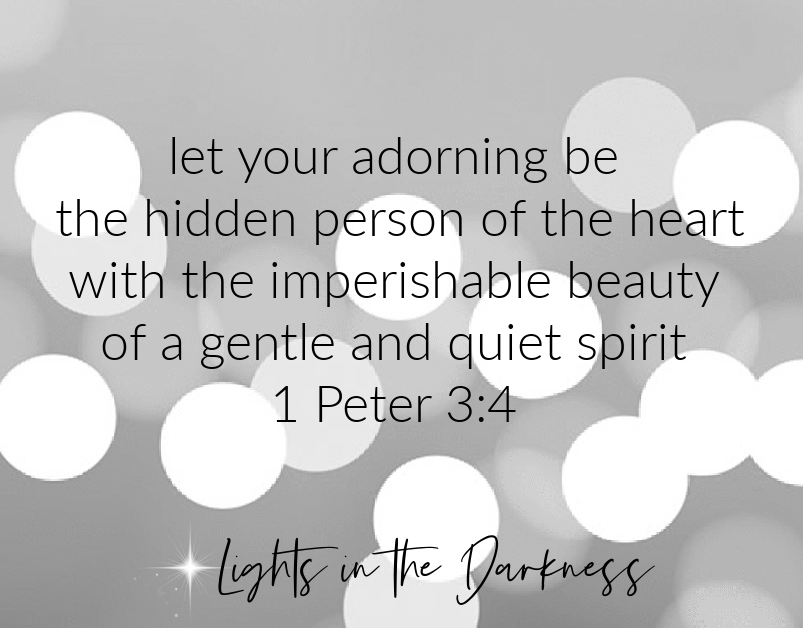
Greetings from your sister in Christ, coming with love and encouragement, gentle correction and guidance. I’m not going into a super deep study here, but a surface overview in which I would encourage everyone to dig a little deeper.
Women, we typically love to feel beautiful. We want to feel good about ourselves. That’s the messages we’re fed all the time—confidence, assertiveness, self-esteem. Especially in an I-am-woman-hear-me-roar, feministic and competitive society.
Numerous women love to keep up with the latest trends in fashion, hair, and makeup. There’s always been some sort of fad (just picture the 1920s, 50s, and 80s; I’m sure a certain image comes to mind for how a woman would look in each era), even in the days of the Bible. For example, every portrayal of Cleopatra I’ve seen depicts the Egyptian queen adorned with elaborately decorated hair, braided and crowned, heavily lined eyes, and sometimes rather revealing gowns. I’m sure a lot of you have that Elizabeth-Taylor impression in your mind. And it wasn’t unique to Egypt either. “Such ‘external…adorning’ can be witnessed in portraits and sculptures from the first century, where the elaborate braiding of women’s hair and the wearing of ostentatious jewelry was common in upper-class Roman society” (ESV STUDY). Basically, the reason for such cosmetics and ornamentals was to be ostentatious. Ostentatiousness is “attracting or seeking to attract attention, admiration, or envy” (Merriam Webster). It’s derived from a Latin word which means to “display.” Isn’t that the goal of being trendy and made up with perfect hair and just the right accent pieces of jewelry—to accentuate, improve, and display one’s physical beauty or parade one’s “individuality?”
This is the way of the common woman.
But what does Scripture have to say about this for the Christian woman?
First, we have to understand, modesty isn’t just the way we dress. Most Christian memes, many of which I’ve shared, portray modesty as dressing the body in an appropriate manner to glorify God and not seek attention. And rightly so! Modesty undoubtedly includes the clothing we choose. However, modesty goes beyond just the way one dresses, and it’s not just for women, either—but women are who I am addressing here.
Modesty by basic definition is “the quality of not being too proud or confident about yourself or your abilities: propriety in dress, speech, or conduct” (Merriam Webster).
We see modesty used in 1 Timothy 2:9—Paul’s letter instructing Timothy about various issues in the church of Ephesus. His letter primarily addresses false teaching—warning, identifying, and confronting false teaching—which also offers a description for “Gospel-shaped living…expounding in specific terms what true gospel living should look like” (ESV STUDY). These instructions on how to live in godliness for the church of Ephesus still apply to Christ’s church today. At that time, the problems men faced in the church were anger and quarreling (1 Timothy 2:8), and women had the issue of dressing ostentatiously, caring more about their appearance (the outward) instead of their conduct (the inward – 1 Timothy 2:10).
The same instruction is seen in Peter’s letter of 1 Peter 3. Here, women—namely wives—are instructed not to focus on outward adornment, but inward cultivation of the beauty of gentleness and a meek spirit.
Both passages paint a pretty clear picture of how a Christian woman, even now, should conduct her behavior (pretty contradictory to every sassy, brassy woman portrayed today).
While there is no complete prohibition for adorning oneself, the key is that when women begin to focus too much on the outward, beauty itself can become somewhat of an idol, an obsession. For instance, if we spend more time in front of a mirror, shopping, following the latest trends on social media, and the like, rather than spending time in Scripture and prayer and focusing on strengthening our Christian character, living in holiness/godliness, we lose focus of propriety and priorities. Women should not only dress in a way that is proper, but should intentionally act in a manner which is modest: not being proud, not focusing on vanity (“pride in oneself or one’s appearance” [Merriam Webster]), not being consumed with clothing, hair and makeup, not glancing in the mirror at every pass, not comparing oneself on social media or emphasizing oneself on social media with floods of “selfies,” not focusing on self-esteem, but instead developing God-esteem, and not being boastful, bragging about oneself and one’s accomplishments or circumstances.
And, ladies, my finger pointing has three pointing back at me as well. I play with all those Snapchat and Instagram filters, too. Especially the ones which display an image of made-up beauty. It’s something we all need to work on.
We should put the mirrors and the phones down and pick up our Bible. We should be more concerned about our “hidden” beauty, so much so that it become evident in our lives, not by our own admission through arrogance, but by our works, our actions in the way we conduct ourselves.
We must never forget that we are the dwelling place, the temple, of the Holy Spirit, and as such, He offers us moral power—sanctification–to continuously grow in holiness, doing good works and living in a manner worthy of God and the calling we have received (1 Thessalonians 2:12; Ephesians 4:1). This means that we are no longer tied to the “common,” unsaved woman’s views, but have been adopted by the Father as His daughter, and are therefore united with Him through His Spirit, living as a new creation. We do not do what looks like the world– “You adulterous people! Do you not know that friendship with the world is enmity with God? Therefore whoever wishes to be a friend of the world makes himself an enemy of God.” James 4:4
This next verse of Scripture (and most of you have read it) needs to be read, reflected upon, and put into practice:
“Charm is deceitful, and beauty is vain, but a woman who fears the LORD is to be praised.”
Now go back and read that verse again. Slowly. Contemplate it. Drink in every word. Charm—form and appearance of a woman–can be faked, fraudulent. Beauty is vain—”worthless, vanity, as of idols” (Blue Letter Bible). But a woman who fears the Lord–reveres, respects, obeys, and stands in awe of the Lord–is to be commended/praised.
I pray that you take time to read Scripture and study up more about living the Christian life, about modesty, and about proper roles for both men and women.
References
“Ostentatious.” Merriam-Webster.com Dictionary, Merriam-Webster, https://www.merriam-webster.com/dictionary/ostentatious. Accessed 19 May. 2022.
“Modesty.” Merriam-Webster.com Dictionary, Merriam-Webster, https://www.merriam-webster.com/dictionary/modesty. Accessed 19 May. 2022.
“Vanity.” Merriam-Webster.com Dictionary, Merriam-Webster, https://www.merriam-webster.com/dictionary/vanity. Accessed 19 May. 2022.
All Scripture (unless otherwise noted): English Standard Version Bible. 2021. BibleHub.com and
English Standard Version Bible. 2016. Crossway
Blue Letter Bible. heḇel. Retrieved May 23, 2022, from H1892 – heḇel – Strong’s Hebrew Lexicon (esv) (blueletterbible.org)
